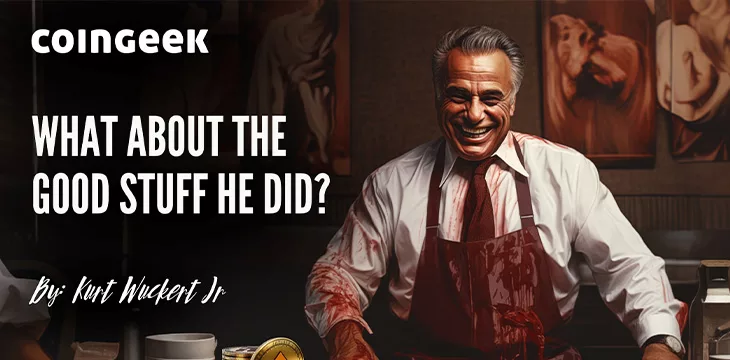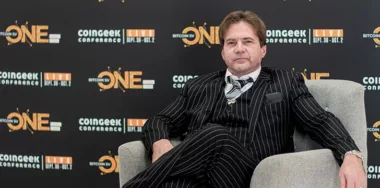For at least the last six years, I have been saying if there’s a Bitcoin community at all, we should focus collectively on building good businesses that change the real economy. One of the first ways to do that is to take the gray areas of the gray markets that Bitcoin straddles and seek to bring them into the mainstream with impeccable moral character. If we can show that we can be above reproach and create value that can’t be created any other way, perhaps the world will value what we are offering! “Crypto” influencers might shallowly agree with my sentiment while white-knighting for the now disgraced
Changpeng Zhao—more commonly known as CZ—out of the other side of their mouths.
CZ, the now former CEO of Binance, has pleaded guilty to serious financial crimes. Some tax evasion, accounting errors, or crimes of resistance against regulatory overreach would be honorable—even if they are indeed illegal. But CZ wasn’t the leader of such a resistance. He made his fortune laundering blood money for terrorist groups like ISIS and operating a shadow bank for human traffickers and cyber criminals. His guilty plea not only spotlights CZ’s role in enabling global atrocities but also brings out some absolutely nauseating responses from the crypto Twitterati. Their tone deafness will age like milk, much the same as statements from friends in Chicago and New York who refused to hear anything bad about Al Capone or John Gotti, who, despite their criminal activities, were hailed as neighborhood heroes for their charity.
As industries progress and mature, different types of leaders are required to drive them forward. In the beginning, mavericks are required to take risks and as they progress a shift is required to more conservative drivers.@cz_binance was the ultimate leader for our industry… pic.twitter.com/1xjjURwaLY
— Ran Neuner (@cryptomanran) November 22, 2023
Al Capone, famously known as “Scarface,” ruled the Chicago underworld during the Prohibition era. His criminal empire was vast, stretching across illicit liquor trade, gambling, and prostitution. Yet, Capone was seen as a modern-day Robin Hood by some, donating to charities and ingratiating himself with the public.

He was known for his seemingly generous acts, like opening soup kitchens during the Great Depression. However, these acts of ‘kindness’ were a smokescreen for his brutal regime, which included orchestrating the infamous St. Valentine’s Day Massacre. His eventual conviction for tax evasion was an unceremonious way to get this vicious killer off the street. But were there normal people crowing that the taxes were immoral, and therefore, Capone should have been found not guilty? I guess there probably were…
f*** the state, f*** kyc/aml and all fincen bs. f*** the weaponization of the usd!
— moonsettler 😸 maxi CTV+CSFS lfg! (@4moonsettler) November 27, 2023
John Gotti, the “Teflon Don,” led the Gambino crime family in New York City. Gotti was a master of public relations, often lionized as a “Dapper Don” who was untouchable by the law because of his smooth demeanor, slick looks, and warm social intelligence. His reputation in the community was bolstered by showy displays such as extravagant “public” fireworks events funded by the benevolence of Mr. Gotti himself. He was perceived as a benefactor in the neighborhoods he controlled because he was. He was feeding the poor and entertaining the everyman! However, beneath this veneer of love for his community laid a ruthless criminal responsible for a multitude of crimes, including murder. Gotti’s fall came in 1992 when he was convicted of murder and racketeering, and then sentenced to life in prison.
But was CZ as bad as the mod bosses of yesteryear?
You didn’t step down.
You were forced to step down due threats of violence and extortion from strangers you’ve never even met.
You are a 1st generation crypto hero.
Keep your head up high! https://t.co/2hVJ0bGi6T— Roger Ver (@rogerkver) November 22, 2023
CZ, in a similar vein, has been a revered figure in the “crypto” community, often seen as a visionary leading the charge toward financial revolution. His recent guilty plea to abetting financial crimes certainly shatters this image in the eyes of average people, but the “crypto” influencer crowd has been quick to show their love to the financier of brutal and violent international crimes. It is a stark reminder that no matter the facade of goodwill, individuals who enable and profit from criminal activities must face the consequences of their actions. But the people who are in the grift just might go down with the ship because they are too twisted to see the blood on the hands of their heroes. They try to spin the “attack” on CZ as an attack on Bitcoin or the “crypto” economy—which disgustingly ignores the victims of his crimes!
“A great man is hard enough on himself; a small man is hard on others.”
— Lao Tzu
Thank you, @cz_binance, for everything.
Bullmorning 🌞— Bull.BnB (@bull_bnb) November 22, 2023
Like Capone and Gotti, CZ’s actions have had very real and devastating impacts. The shadow banking services provided by Binance facilitated activities of notorious organizations such as Al Qaeda and ISIS, and played a role in human trafficking and various types of extortion and cybercrime. The profits from these illegal activities, no matter their subsequent use, are tainted with the suffering of innocent people. It’s a harsh reality that often gets overshadowed by the glamourized narratives around these figures or the very real criticism that the “real banks” do the same things and get away with it, or that the tax man is more guilty of crime than any non-government criminal. The threads of morality are barely holding this rickshaw together…
CZ did more than any government could ever do to further financial innovation/freedom and he did it without using a cent of stolen tax money.
— Toby Cunningham (@sircryptotips) November 22, 2023
I’m reminded of the words of Jesus of Nazareth from the 7th Chapter of the Book of the Apostle Matthew:
“Why do you see the speck that is in your brother’s eye, but do not notice the log that is in your own eye? Or how can you say to your brother, ‘Let me take the speck out of your eye,’ when there is the log in your own eye? You hypocrite, first take the log out of your own eye, and then you will see clearly to take the speck out of your brother’s eye.”
The point isn’t that the evil actions of the central banks or their commercial counterparts are acceptable, nor that Binance’s are acceptable in light of the crimes of the old-world financial titans. If Bitcoin is to make the world a better place, we need to stand against market collusion and wickedness—even if the evil that happens across the ocean makes our wallets a little fatter at home.
CZ tried to save people from FTX & even helped bring SBF to justice.
He is now sacrificing himself to save Binance crypto exchange and probably the whole bitcoin bull run.
The man is a hero. pic.twitter.com/URMPBrZupk
— Altcoin Daily (@AltcoinDailyio) November 22, 2023
As we reflect on this new chapter in the industry, it is essential to recognize the importance of accountability and the rule of law—or, at the very least, ethics like the Non-Aggression Principle. While the blockchain world is still in its nascent stages, it is crucial to ensure that it does not remain a haven for illicit activities. CZ’s guilty plea should serve as a wake-up call to the industry and its enthusiasts: endorsing or turning a blind eye to criminal activities for financial gain is unacceptable.
CZ sacrifice himself for the BullRun to continue
— Elja (@Eljaboom) November 22, 2023
As we move forward, let’s strive to build an ecosystem that values transparency, integrity, and either legality or morality, considering the lessons learned from the downfall of figures like CZ, Capone, and Gotti. In pursuing innovation and financial freedom, let us not forget the moral compass guiding us toward a more just and equitable world. And last of all, remember that a bucket shop casino printing and burning BNB and managing shady swaps of Tether with Deltec bank and directing the flow of capital with predatory market-makers who front-run their own clientele is neither heroic nor is it “progress” for Bitcoin or whatever nonsense people are into in the “crypto” world.
These things are all noise that smothers the promises of Bitcoin. Bitcoin looks a lot like real business and hard work, which is one of the reasons it has suffered so badly at the hands of easy, dirty money.
Follow CoinGeek’s Crypto Crime Cartel series, which delves into the stream of groups—from BitMEX to Binance, Bitcoin.com, Blockstream, ShapeShift, Coinbase, Ripple, Ethereum,
FTX and Tether—who have co-opted the digital asset revolution and turned the industry into a minefield for naïve (and even experienced) players in the market.
New to blockchain? Check out CoinGeek’s Blockchain for Beginners section, the ultimate resource guide to learn more about blockchain technology.








